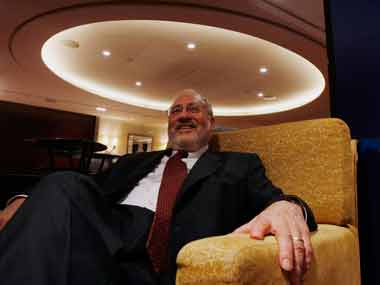Patna: Nobel laureate American economist Joseph Stiglitz today said that FDI in multi-brand retail in India would promote instability due to exploitative and corrupt practices adopted by MNCs to monopolise the retail markets in any country.
[caption id=“attachment_588089” align=“alignleft” width=“380”]
 Stiglitz said it would bring exploitation of the labour force and promote corruption. Reuters[/caption]
Stiglitz said it would bring exploitation of the labour force and promote corruption. Reuters[/caption]
“The FDI in retail can promote instability by way of the exploitative and corrupt ways of the MNCs to hold sway over retail markets,” Stiglitz said. “India must take into account a prospect of instability before allowing FDI in multi-brand retail,” he said while delivering a lecture on “Redefining Capitalism” here.
MNCs will bring in corruption and exploitation of labour force after setting up shops in India, he said. Pointing that the retail giant Wal-Mart bribed officials at various levels in Mexico to monopolise the retail market there, he said, “May be, you want to learn bribery. But I don’t understand what India is trying to get out by allowing FDI in multi-band retail.”
Stiglitz said it would bring exploitation of the labour force and promote corruption. “FDI can bring with it capital, technology, know-how, training and access to market and can promote growth and job creation. But the foreign firms can be even more efficient at exploitation, in one way or the other,” he said.
Denouncing the pro-FDI in retail theory that it will improve the supply chain and enhance welfare of the farmers, producers and consumers, Stiglitz painted a gloomy picture of the retail scenario in India.
“Some of the MNCs are noted for their poor labour relations, workers’ exploitation, discrimination and bribery,” he said after pointing to the widespread agitation by the people of Mexico against the retail giant Wal-Mart recently. “There is also no evidence that opening up markets to risky financial products pioneered by the foreign products, including financial products like consumer durables and derivatives will improve growth, but there is ample evidence that it will increase risk,” the 70 year-old economist said.
Stiglitz, who was on a three-day visit to Bihar, praised Bihar government for bringing about economic development in the state. Earlier, Chief Minister Nitish Kumar in a brief welcome of the Nobel prize winning economist, said that he was of the view that the development should be laced with justice and his government has set out to attain economic success in this very principle in Bihar.
The GDP growth rate was not reflective of development in true measure, he said. The Nobel laureate, who visited sites of the dilapidated ancient Nalanda University, accepted Nitish Kumar’s request for the former’s help in getting the world heritage status for the world’s oldest international institute of learning.
Stiglitz described Bihar model of development and growth as a classic case of the state being an important instrument of promotion of growth. Speaking on the issues related to the global economies and economic meltdown in 2008, he said that the economic crisis last decade was due to US government relaxing its control or guidance of the market forces as a result the sub-prime crisis was allowed to develop as a major problem that had cascading effect on the entire economy.
Stiglitz gave the example of Scandinavian countries and Germany as model economies in which the states have played pivotal role in regulating their economies for maximum benefit to their population and withstanding global turmoils.
On the contrary, the economies of some East Asian countries collapsed in the last decade after the respective governments allowed the market forces to dominate the field, he said. “The states’ role in shaping policies or regulating markets have been time tested mantra and it will remain so,” he said.
PTI
)